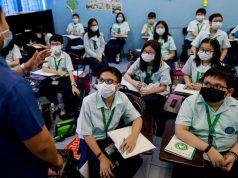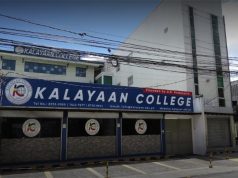MANILA, Philippines – Two partylist lawmakers on Thursday asked the Commission on Higher Education (CHED) to take back a recent memorandum “strongly encouraging” mandatory drug testing as a requirement for students entering and currently studying higher education institutions.
Representatives Sarah Elago of Kabataan and Antonio Tinio of ACT Teachers said CHED Memorandum Order 64-2017 violates the students’ rights to education.
The lawmakers raised the issue at the briefing of the House appropriations committee on the proposed budget of CHED for 2018.
“What is the basis for this?” Tinio asked. “You are bringing ‘Tokhang’ [the police anti-drug campaign that has claimed numerous lives] to schools. You might find blood in your hands if this goes on.”
Tinio reminded CHED that, under the Dangerous Drugs Act, drug testing should only be done randomly.
“Take it back. Follow the law,” Tinio said.
CHED chairperson Patricia Licuanan claimed her commission “was not prescribing anything.”
“It’s not a requirement,” she added.
Tinio retorted, “Why are you encouraging them? What is the legal basis? You know what is going to happen. I’m serious when I say that blood will be in your hands.”
CHED Memorandum Order 64 lays out the guidelines for HEIs that require drug testing of students. This is in accordance with the Higher Education Act of 1994 and the Comprehensive Dangerous Drugs Act of 2002, and in support of the administration’s war against drugs.
In the order, Licuanan said that schools must “adopt a strong policy on drug prevention” and use “all means necessary and reasonable” to ensure that the school environment is healthy and drug-free.
The order says local government units, the Philippine National Police, or any other law enforcement agency may conduct drug-related operations in school, “but only upon prior written approval and coordination” with the latter.
It also states that drug testing will be random, and that under the Dangerous Drugs Board Regulation No. 6, s. 2003 and No. 3, s. 2009, schools must ensure that drug testing is conducted “primarily for prevention and rehabilitation” and must “guarantee and respect the personal privacy and dignity of its students.”
The order stressed that drug test results will “be treated with utmost confidentiality” and will “not be used in criminal proceedings”.
But before a school can conduct a drug test, it “must be able to show that it has the approval of its Board of Trustees/Directors/Regents and has gone through the necessary student consultation process.”
Department of Health accreditation is a must for any drug facility, physician, or private medical practitioner which will conduct the drug test.
Applicants for enrollment must be informed of the requirement of mandatory drug testing at the moment they apply. They will be responsible for the fee, and must only go to any DOH-accredited drug facility or the HEI’s DOH-accredited drug facility, if any.
Meanwhile, for 2018, the CHED proposed a budget of P12.41 billion or 33 percent lower that its 2017 budget.
In 2016, CHED has unused appropriations of over P1 billion – a situation similarly observed from 2012 to 2014.
CHED, together with other concerned departments, is set to craft the implementing rules and regulations for the new law granting free tuition to students in public tertiary schools.










